Introduction
Board games are found in mythology and folklore all over the world, dating back thousands of years. They were an important part of play and entertainment in ancient societies. More recently, board games have become a way for children to learn valuable life skills such as problem-solving, strategy making, language development, counting and math skills, memory recall and social interaction. Aside from developing important computational abilities, board games require players to think collaboratively and use creative problem solving skills. Playing board games increases logical thinking abilities too; children will consider various strategies for success which can help them in their future studies”as well as their personal lives beyond school.
Board games promote social interaction by teaching kids how to communicate with other people through pronouns like “my” and “your” or expressing ideas through short sentences with proper grammar. It encourages children to self-reflect while they make decisions and to understand the concept of compromise when playing together. Board game also eases boredom during family time as it helps everyone bond, turning often mundane tasks into something enjoyable that both adults and children look forward to doing.
Benefits of Board Games
Board games have the potential to enhance child development in several areas. Cognitively, playing board games can help children with problem solving and strategy, as well as language, math, reading comprehension, and creative thinking skills. In addition, the ability to win or loseboard games teaches them important lessons in social interaction such as collaboration, competition, sharing and respect for others opinions. From an emotional perspective, board games are a great way to bond with family and friends and help develop self-esteem as children master increasingly difficult levels of play. Physically, board games also offer movement opportunities from running around the house to roll a dice or spinning a spinner. Board games also promote patience as children wait for their turn and allow for different levels so that adults can play with little ones. Lastly, board games are engaging enough to keep children’s attention for extended periods of time. All of these benefits make playing board games an invaluable experience that promotes growth across all areas of development.
Cognitive Development
Playing board games can help children develop important cognitive skills, such as strategic planning and critical thinking. Strategic planning allows players to think ahead and anticipate their opponent’s moves, rather than simply reacting to what has already happened. This helps children become more analytical and develop a better understanding of complex concepts surrounding cause and effect, probability, risk assessment, and sound decision-making.
Additionally, playing board games is an effective way for children to work on their memory development. Challenging games like Chess or Go require a certain level of memorization of positions on the board in order for long term strategies to be successful.
Finally, board games are an excellent way for children to practice problem solving skills without the pressure or difficulty associated with structured testing situations. During the game, players take turns interacting with each other while trying to reach their individual goals amidst unforeseen obstacles – this teaches how to navigate through difficult situations while simultaneously learning invaluable skills such as conflict resolution and civility.
Social Development
Playing board games is an excellent way to help children develop social skills. Through cooperative play, children learn how to think and make decisions together, as well as practice diplomacy and negotiation. Board games also teach important problem-solving skills, like sorting best solutions from worst ones. Additionally, they encourage socialization among all players, so that children can learn how to listen and share ideas with each other ” critical components of strong communication. Finally, playing board games stimulates creativity and encourages teamwork; for example, working together to overcome challenges or attain a goal in the game helps foster team-building skills that can then be applied in real life scenarios. All of these aspects culminate in teaching children the importance of collaboration within a group, and promote effective communication skills in both understanding what is being said, as well as expressing own ideas. Ultimately, board games provide great opportunities for child development from a social perspective.
Emotional Development
Board game play offers children the opportunity to practice their emotional and social skills in a low-risk, fun setting. Playing board games gives children the space to understand how to engage with others positively and productively, handle disappointment and successes in a respectful manner, practice conflict resolution strategies through negotiation and compromise, learn how to be gracious winners, use strategy and problem solving skills, delay gratification, work on impulse control and finesse social cues. In addition to all of these core benefits from board game play, children also get additional advantages such as gaining self-confidence by recognizing their own strengths and being respected by adult rules players.
For instance, when playing cooperative or team games with one another, children learn what it takes to contribute as an effective part of a larger unit. They also have an opportunity to virtualize different scenarios that they would not normally encounter in their daily lives while learning proper coping mechanisms for stress-related situations. Through board games, kids learn that mistakes are just part of growth”and can actually lead worthwhile lessons because of them. Board game play teaches perseverance as well as patience despite frustration or fatigue throughout the duration of a game session. It also encourages constructive communication between other players which facilitates meaningful social interactions. Allowing kids to interact with one another in a more relaxed atmosphere helps reinforce the concept of listening attentively along with cooperating with other participants’ ideas which ultimately strengthens interpersonal relationships among family members and friends alike.
Types of Board Games
Board games are a great way to introduce children to the joy of playing games. Board games can help children develop problem-solving, strategy, planning and other higher order thinking skills. Board games can also foster social interactions and be a fun way to make learning fun while developing key academic skills such as reading skills, math skills, spatial reasoning, critical thinking and cooperation.
Moreover, board games can teach children important life lessons like patience, sportsmanship and good decision making. According to research by child psychologists at Brigham Young University, cooperative board games may even support emotional development in kids because they practice expression of their emotions in a structured environment while following rules of social behavior such as taking turns or having conversations with others during play. Furthermore, such group activities offer opportunities for children to take leadership roles or improve communication amongst peers.
Specifically speaking about some popular types of board games: there are party board games specifically designed for groups of players who want to entertain themselves with creative activities; role play board games that embrace and teach stories or adventures; educational board activities designed for teaching particular concepts; card based light strategy or luck based board games that involve elements of move selection from a hand of cards or randomization via dice rolls; puzzle and logic based puzzles suitable for single player or 2-4 player gamer sessions which require logical association between objects on the gameboard and more. All these varieties allow children to explore multiple aspects within different types of settings while building important cognitive skills applicable across many domains like communication, cooperation, concentration and strategic planning.
Final Thoughts
Board games promote social, emotional, cognitive, and physical development for children in a fun and engaging way. Board games often involve taking turns, strategy planning, problem-solving, counting and sorting skills all while the players are having a good time. As they play through their board game experience there will be some moments of positive reinforcement when they make a correct move or gain points by completing different levels. Learners will also get logical thinking practice as they work out how to win the game. Additionally, they gain recognition of cause and effect when one move affects the next step.
As part of children’s socialization process board games offer up a safe learning environment that helps build self-esteem. Players learn how to cooperate with one another along with appropriate behavior when winning or losing. Board games can develop excellent levels of concentration during patterns recognition which has proven to be very beneficial in school activities such as memorizing facts or math equations. This level of focus also teaches delayed gratification which is an important life skill for younger generations to understand and appreciate the bigger pay off rather than going for quick relief without consideration for consequences.
Moreover, board games offer a great way for parent and child’s interaction together where new ways of communicating boundaries is explored without raising voices or aggression towards each other; this is especially true if things do not go according to plan during gameplay but need to have respect on everyone’s decisions every time . Group interaction promotes interactive dialogue where children learn social navigation skills along with assisting them in improving their communication skills. All this put together provides an tremendous opportunity to influence meaningful conversations while establishing better relationships between family members and friends alike – A strong bonding experience that cannot be accomplished elsewhere!

I love playing all kinds of games – from classics like Monopoly to modern favourites like Ticket to Ride.
I created this blog as a way to share my love of board games with others, and provide information on the latest releases and news in the industry.





